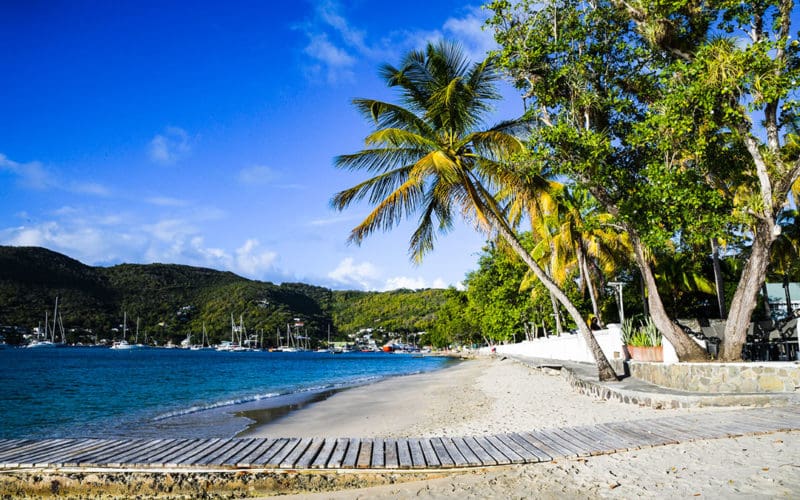A crime in the Caribbean and how three voyagers coped
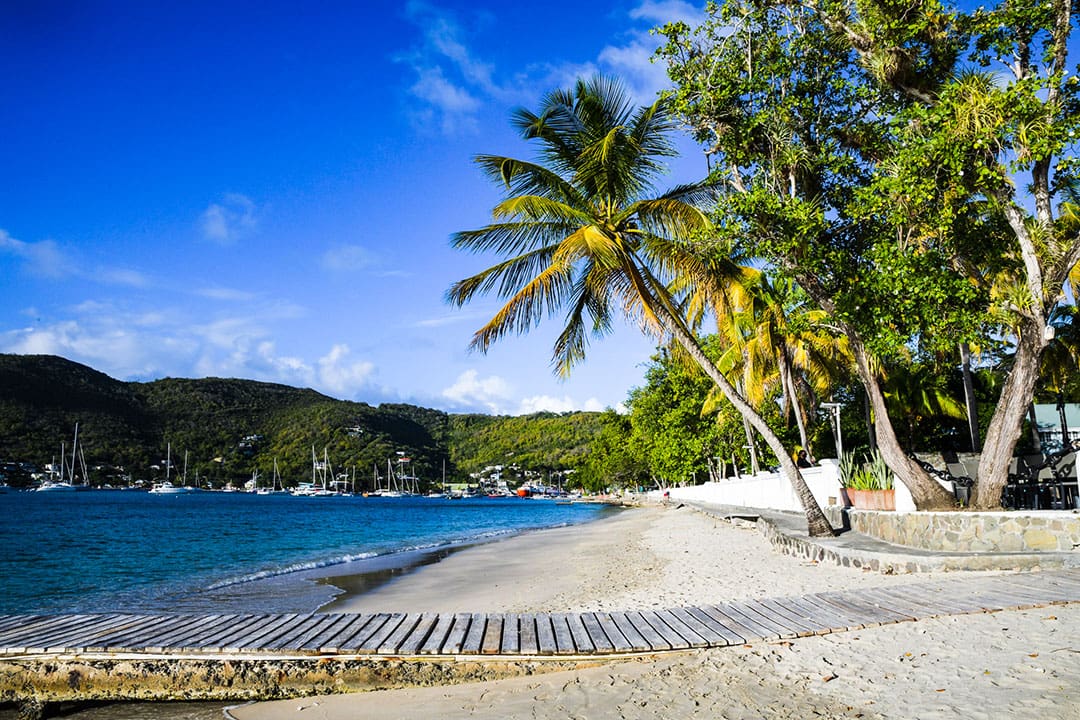
While cruising in the Caribbean following a crossing of the South Atlantic, on Rebecca Childress’ Valiant 40, Brick House, we arrived in Buccament Bay on St. Vincent. We were accompanied by a buddy boat: solo sailor friend Paul Teabo aboard his Island Packet 36, Getting There. What followed was an unfortunate and thankfully rare brush with crime while cruising.
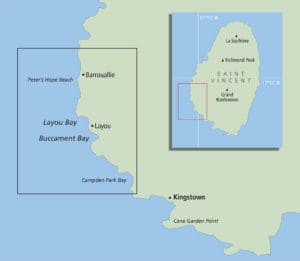 We both anchored in the northwest corner of the bay, near a friendly fishing village. Rebecca and I have strict security protocols, and at night, we hoist the dinghy, secure it with a cable and lock, and leave on lights. We lock sports equipment and items of value in cockpit lockers, but we sleep with the companionway and deck hatches open for ventilation. We arranged with Paul to stay on VHF channel 17 and keep cell phones nearby. St. Vincent is an island with a reputation for theft and we all felt some heightened awareness was in order.
We both anchored in the northwest corner of the bay, near a friendly fishing village. Rebecca and I have strict security protocols, and at night, we hoist the dinghy, secure it with a cable and lock, and leave on lights. We lock sports equipment and items of value in cockpit lockers, but we sleep with the companionway and deck hatches open for ventilation. We arranged with Paul to stay on VHF channel 17 and keep cell phones nearby. St. Vincent is an island with a reputation for theft and we all felt some heightened awareness was in order.
The next morning we went snorkelling through a bat cave and explored the amazing reefs. After lunch we spent some time ashore watching the local fisherman haul in a seine net. By sunset I had established a friendly rapport with them, taking part in what was a truly special communal event. By evening I felt secure in the knowledge the local fisherfolk were friendly, hardworking, good people. Despite this, we kept our security in place. A small but not insignificant measure Rebecca takes is to remove the first step of the companionway, so if someone proceeds downstairs they are likely to fall. We never go ashore after dark in unfamiliar anchorages, and we light up the cockpit. After dinner, we went to bed early. At 0200 Rebecca heard an ever so quiet bump on the hull and went up to investigate, with me two steps behind. (Yes, despite my protests, this is normal with Rebecca!)
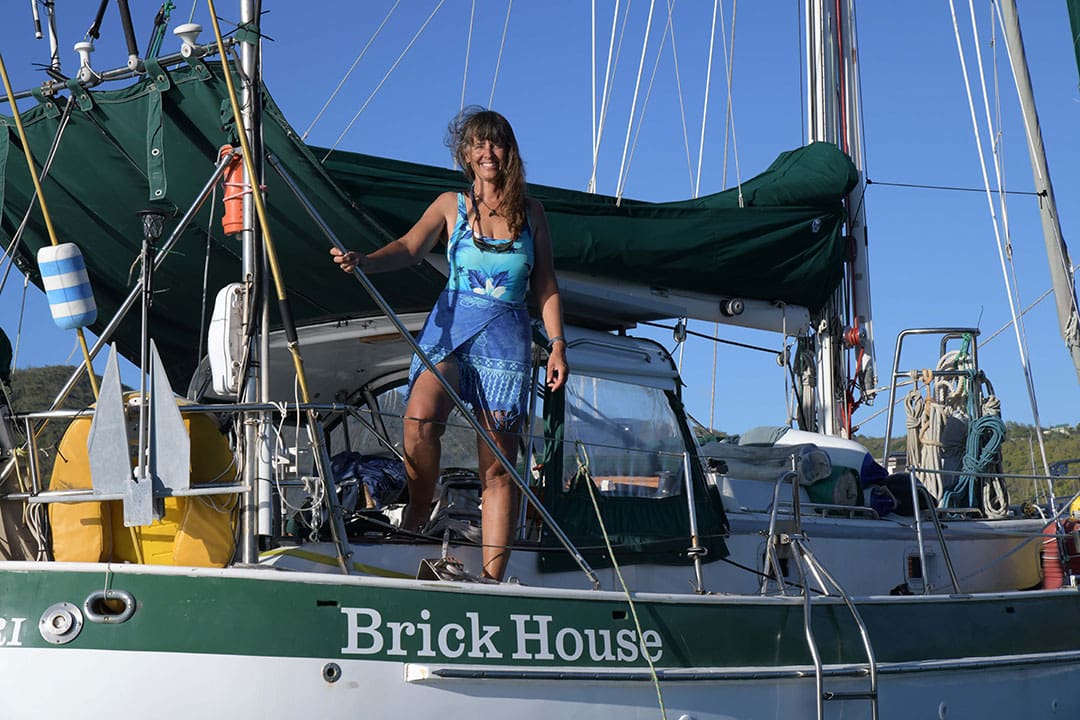
We found a rowboat with two young men holding on to our gunnels. Rebecca told them in no uncertain terms they had to move on despite their claiming they only wanted drinking water. We did think they were actual fishermen on their way out to fish and had stopped alongside to see what small-time opportunity might be available. The COVID masks should have alerted us to something more sinister. They rowed towards our solo friend’s boat. After they saw me watching, however, they veered off and headed around the point, a half mile to the south. We assumed the threat had passed and retired below still on high alert, checking hourly for any activity in the bay. We tried to call Paul by VHF and cell phone, but to no avail. In hindsight what we should have done was lower our dinghy and alert our friend and the one other yacht at anchor in the bay. IN our defense, at 0200 one is loathe to wake people when uncertain of an actual threat.
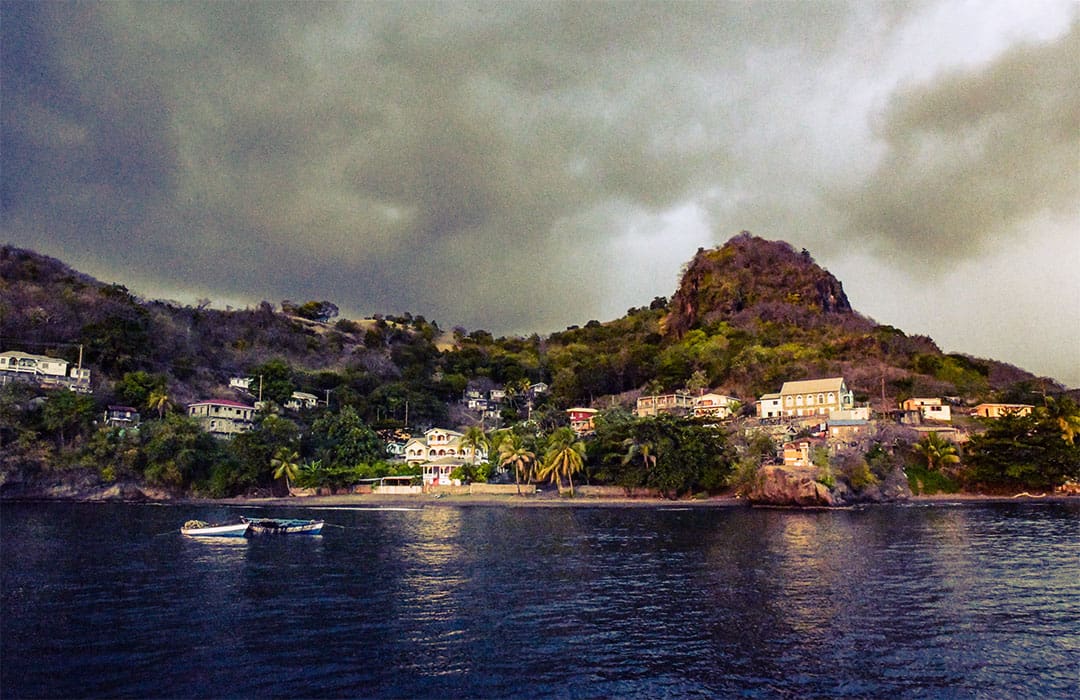
A crime revealed
At about 0600 Paul arrived alongside in his dinghy with a frantic knock. He had been boarded and robbed by two young men wearing masks. One assailant held him down by the throat in his bunk, with the other threatening him with a short pipe. They took his iPhone, laptop, cash, credit cards, an expensive camera, and a Bluetooth speaker, among other things. They demanded gold and cocaine, and they wanted to know where the safe was. Our friend convinced them, despite the threat of further violence, that those items were not on the boat and are not normally carried by cruisers. After they ransacked the boat, they tied our friend up using shoelaces. They attempted to make off with his dinghy, but it was too complicated an affair lowering the dinghy, so they abandoned that endeavour and left in their stolen rowboat.
After assuring Paul was okay, we immediately tried to raise the St. Vincent Police, but we had no luck with any of the numbers found online. I put out a call on channel 16 for the Coast Guard, which was routed to a signalling center and then on to the St. Vincent Coast Guard for us. The extremely professional St. Vincent Coast Guard radioed us on channel 16 in minutes.
In the meantime, I had noticed a blue and white rowboat on the beach opposite, awash on the shore, filling with water and sand. I recognised it as the same rowboat in which the men had approached us. It seemed bigger than both Rebecca and I recalled, but I was sure it did not belong to our friendly fishermen, as their boats are all cared for, high and dry, or at anchor offshore. I hailed a passing fisherman from the previous day’s net hauling and asked if he knew whose boat it was. He replied that it belonged to a fisherman in the next bay to the north, Layou Bay, and must have been stolen. They had already examined it, and apparently found two knives in the bilge. They informed me they had alerted the owner, but he would in all likelihood not be coming for it for fear of being implicated.
On approach the Coast Guard asked on VHF our COVID status and if any crew were symptomatic. I informed them we were of good health, fully vaccinated and boostered. We were asked to put on our masks, and put out our fenders on the port side. This took less than 45 minutes from our first call on VHF. The Coast Guard tied up alongside us and made notes and took photos. We were told the police were on their way, and after no more than 10 minutes they departed. I would like to send out our thanks to the St. Vincent Coast Guard for their professionalism. It is reassuring to know they are out there.
The police arrive
Within minutes the police came alongside Brick House in a local fisherman’s skiff. Two plain-clothes police boarded to take our statements. After a brief interview, the senior officer, a large man with 18 year of service, decided we should return to the scene of the crime. He seemed nervous and told me he didn’t like boats and couldn’t swim. I gingerly ferried him and Paul across to Paul’s yacht and then returned to fetch Rebecca and the younger officer. Within minutes the larger policeman was sweating profusely and said he was not feeling well. Rebecca offered both of them water, and we divided a sea sickness tablet between them. Paul and Rebecca were asked to write their own statements of the evening’s events as our senior officer was not up to it. Rain set in, and the two officers and I were huddling under the canvas cockpit cover while Rebecca and Paul wrote out their statements below.
I inquired about the likelihood of finding the culprits. I asked if there were any places we could follow up to see if the goods had been pawned. There are a few pawn shops in Kingstown. There was plenty of opportunity to take fingerprints, but the police had no equipment. There is no database of recorded fingerprints on St. Vincent so they don’t bother lifting prints. I asked if they had a database of known offenders. Negative. I asked if we would get a case number. Negative. I asked if our friend could get a copy of the police report for insurance purposes. Yes, but only from the Kingstown police headquarters, a half hour away by bus, at a cost of $40 USD. The officers never went below.
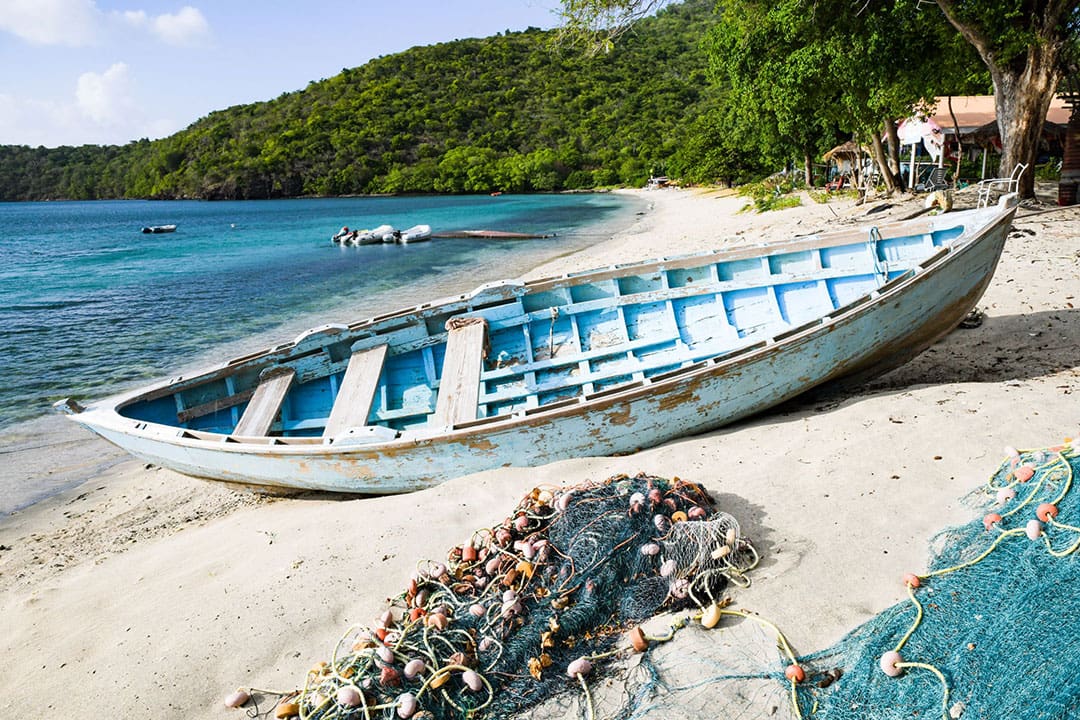
Shortly before wrapping up the “investigation’’ our friends in their fishing skiff passed by and I asked them to supply the officers with the name of the owner of the blue and white rowboat. I was left wondering why the police never thought of it as I had informed them it was the boat used in the evening’s events. It’s a small town, perhaps they already knew. We ferried the two officers ashore convinced they would do what they could in their investigations despite the lack of resources.
One rather frightening fact revealed by the police is that the pipe the assailant wielded was in all probability a homemade pipe gun. It is normally loaded with a single 12-gauge shotgun shell. We were all convinced the robbers were not fishermen. The knots they used to tie up our friend were inadequate, and he managed to easily free himself with his teeth.
There was a buzz of activity on the shore with locals wanting to know the full story. This was the second time I experienced a sailboat boarding in the Caribbean. The first being a month ago at anchor off Canouan, also in St. Vincent and the Grenadines, while doing charter work. We were boarded while sleeping and my cell phone was taken. My experience both then and now is that the locals are extremely distressed by the targeting of visiting yachts and it in no way changes my feelings and affection for the wonderful people we meet every day sailing the Caribbean.
Our friend spent the day on Brick House using our facilities to cancel credit cards, contact family, and communicate with his insurers. There was so much data lost, so much work ahead for him, buying a new phone and downloading all the sailing apps and charts, finding lost contacts. Replacing credit cards, driver’s licence and diving license cards. That was the important stuff. Not even touching on the social data and photographs lost.
Further investigations
Later in the day the police returned to the beach. The senior officer waved us over. He was obviously not testing his sea legs any further. We motored across to where the blue and white rowboat was lying beam on in the surge and were further interviewed. There was an elderly, tall gentleman with the police. He looked visibly shaken, and was not introduced, but we soon deduced he was the owner of the rowboat. The police asked us if we could identify the thieves. I guessed straight away they wanted to see if we recognised the owner as one of the two men who came alongside Brick House. We all corroborated that Paul’s assailants were slight, and young.
The officer requested we move to Layou Bay where we could anchor literally on their doorstep, and the police would offer us their protection. We were all loathe to do this as Layou was the bay from which the thieves had appropriated the rowboat, and further we believed we had the Buccament Bay locals looking out for us. We had good holding for our anchor and thought it unlikely thieves would revisit the scene. Layou Bay is not even mentioned in Chris Doyle’s Cruisers Guide. We had a late lunch on Brick House before raising our anchors with an hour’s light left and going to Layou Bay. On arriving we found our investigating officer waving to us from the nearby dock. The police station was reassuringly visible and we could see the police at work inside from our anchorage. This extra unsolicited effort hugely redeemed our feelings towards the local police. They obviously care a great deal about crime against visitors despite being somewhat resource handicapped.
That night we set about extra security. Brick House has a sophisticated GOST security system onboard, but we had rarely used it. When activated the GOST system has a piercing siren that can go off at the flip of a switch, or by the triggering of external sensors. Just after the sunset, Rebecca accidentally set off the alarm. Within seconds my phone rang, our investigating officer was calling to check on us. Rebecca sheepishly told him it was a false alarm.
We inserted stainless steel burglar bars in the companionway entrance, and Rebecca closed all hatches. Our two boats agreed to keep in contact on VHF.
The day before the robbery we had spent snorkelling in paradise. A day later, I was on Brick House guarding the two boats, while Rebecca and Paul went to town to scour pawn shops and collect a police report. Rebecca texted me they had had no luck finding Paul’s belongings, but had bought him a cheap burner phone and managed to replace his prescription meds that had also been stolen. The police say the report will only be available in two weeks!
Unlocking an account
After returning empty-handed from Kingstown, Paul considered leaving for Grenada without the police report. He urgently needed to get back to St. Georges to have his cellular provider issue another SIM card in his name, with the same number. He could then provide Google with a familiar number to send the necessary two-part authentication to unlock his Gmail account. No amount of wrangling will ever recover your Gmail account if all the devices used to initiate it have been lost or stolen. Banks send verification pins to your mobile number, as do many apps. Reconnecting his life was contingent on getting a replacement SIM, but the service provider could not do it remotely, despite having branches throughout the Caribbean.
I called my good friend Joy who agreed to give it a go on Paul’s behalf and work with him to retrieve PIN codes. The next morning, armed with whatever records of purchase and identification Paul could muster, Joy went to the mall and managed to buy a replacement SIM. Back at her apartment and guided by Rebecca and Paul from a remote anchorage, Joy communicated with Google after inserting the new SIM into her phone. An authentication code was sent to it, which after being relayed back to Paul allowed him to access his new account and verify his new burner phone in order to access his account. It was a really amazing piece of administrative detective work which would not have been possible without a good understanding of digital systems and communication, both of which are the absolute lifeblood of any cruising yacht. Having a good, capable friend do the leg work was imperative.
Unfortunately, however, Paul’s stolen items were never recovered, the culprits have still not been found, and insurance is an ongoing questionable process. Meanwhile, Brick House and Paul sail onwards, trying to not let this saga wreck a beautiful experience in gorgeous cruising grounds! n
Michael Hayward is a South African-born sailor, writer, marine photographer, and videographer.

